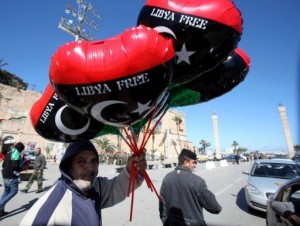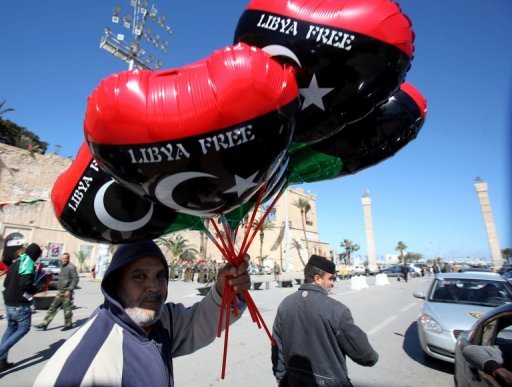
(AFP Photo)
Benghazi (AFP) – Libya on Tuesday celebrates the first anniversary of its “liberation” from the regime of Muammar Gaddafi, even as fighting flared in a former bastion of the slain dictator.
On October 23, 2011, just three days after Gaddafi was captured and killed in his hometown Sirte, the transitional authorities declared the country’s liberation, formally ceasing hostilities.
The new leaders did not announce any specific programme to mark the anniversary, which is a public holiday, but rallies were expected in Tripoli and Benghazi, the cradle of the revolt that toppled Gaddafi.
Cars cloaked with the national flag circulated from the early morning in the capital, their speakers pumping out patriotic songs at full volume. Security checkpoints set up overnight along the main arteries slowed them down.
Fierce clashes in Bani Walid, one of the final bastions of the former regime which is accused of harbouring die-hard Gaddafi loyalists, have cast a pall over celebrations.
“Since the formal declaration of the end of hostilities, Libya has become a country beset by intercommunal strife,” said Claudia Gazzini, senior Libya analyst for the International Crisis Group.
“The central authorities have acted chiefly as bystanders, in effect subcontracting security to largely autonomous armed groups only nominally under the authority of the state,” she said.
Fighting in Bani Walid has fanned old tribal feuds and underscored the difficulties of achieving national reconciliation with former rebel fighters locked in battle against ex-Gaddafi loyalists.
Bani Walid natives, angered by the government-sanctioned offensive against the heartland of the powerful Warfalla tribe, stormed the national assembly on Saturday in protest.
Demonstrators also ransacked the offices of a private television station in Benghazi after it announced that Gaddafi’s son Khamis and the dictator’s spokesman Mussa Ibrahim had been captured there.
The authorities never presented evidence to back these claims.
Bani Walid natives charge these reports were fuelling attacks on their town.
Last week’s scaled-up offensive against Bani Walid came in response to the death of Omran Shaaban, 22, a former rebel from the city of Misrata who was credited with capturing Gaddafi.
Shaaban spent weeks held hostage in Bani Walid, where he was shot and allegedly tortured, before the authorities managed to broker his release.
He later died of injuries sustained during the ordeal, stoking tensions between his hometown Misrata and Bani Walid, long-time rivals who fought in opposite camps of the 2011 conflict.
It also galvanised the authorities to take action against the ex-regime bastion.
Clashes between pro-government forces and Bani Walid fighters over the past week killed dozens of people and wounded hundreds, in scenes evocative of the civil war that toppled Gaddafi one year ago.
To justify the offensive, Mohammed Megaryef, president of the national assembly said that the oasis had become “a sanctuary for a large number of outlaws and anti-revolutionaries and mercenaries.”
Tribal leaders and commanders in Bani Walid, a hilltop town located 185 kilometres southeast of Tripoli, accuse “lawless Misrata militias” of seeking to annihilate their historic rival.
The authorities, they say, are powerless to stop them.


